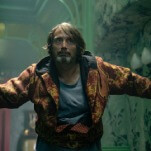It is a kind of dumbing down in a way, because it’s taking our focus away from real-world issues. Films used to be about challenging, emotional journeys or moral questions that might make you walk away and re-evaluate how you felt about… whatever. Now we’re walking out of the cinema really not thinking about anything, other than the fact that the Hulk just had a fight with a robot.
If even a guy who makes his living off of the geek-industrial complex and whose autobiography is titled Nerd Do Well thinks the whole nerd-culture thing has gone too far, perhaps it’s time to do some soul searching. But nerds, particularly when ensconced in the warm, anonymous embrace of the internet, are not good at soul searching. They’re good at being defensive. Thus, Pegg has already been forced to clarify his comments, saying that the idea of arrested development has fascinated him since he wrote Spaced 18 years ago and encouraging fanboys and -girls to think more critically about their role in what has become a massive money-making enterprise:
In the 18 years since we wrote Spaced, this extended adolescence has been cannily co-opted by market forces, who have identified this relatively new demographic as an incredibly lucrative wellspring of consumerist potential. Suddenly, here was an entire generation crying out for an evolved version of the things they were consuming as children. This demographic is now well and truly serviced in all facets of entertainment and the first and second childhoods have merged into a mainstream phenomenon[…]
Recent developments in popular culture were arguably predicted by the French philosopher and cultural theorist, Jean Baudrillard in his book, ‘America’, in which he talks about the infantilzation of society. Put simply, this is the idea that as a society, we are kept in a state of arrested development by dominant forces in order to keep us more pliant. We are made passionate about the things that occupied us as children as a means of drawing our attentions away from the things we really should be invested in, inequality, corruption, economic injustice etc. It makes sense that when faced with the awfulness of the world, the harsh realities that surround us, our instinct is to seek comfort, and where else were the majority of us most comfortable than our youth? A time when we were shielded from painful truths by our recreational passions, the toys we played with, the games we played, the comics we read. There was probably more discussion on Twitter about the The Force Awakens and the Batman vs Superman trailers than there was about the Nepalese earthquake or the British general election[…]
The point of all this is just to get my position clear. I’m not out of the fold, my passions and preoccupations remain. Sometimes it’s good to look at the state of the union and make sure we’re getting the best we can get. On one hand it’s a wonderful thing, having what used to be fringe concerns, suddenly ruling the mainstream but at the same time, these concerns have also been monetised and marketed and the things that made them precious to us, aren’t always the primary concern (right, Star Trek OST fans?)
Also, it’s good to ask why we like this stuff, what makes it so alluring, so discussed, so sacred. Do we channel our passion and indignation into ephemera, rather than reality? Not just science fiction and fantasy but gossip and talent shows and nostalgia and people’s arses. Is it right? Is it dangerous? Something to discuss over a game of 3D chess, perhaps.
Pegg also points out that yes, there are movies still being made for adults, they’re just not being prioritized by major studios. His thoughtful, and, yes, rather geeky—he references Mad Max: Fury Road and Game Of Thrones in his defense—response is well worth a read, especially if you do so in Superman footie pajamas while drinking out of a Doctor Who mug.
[via The Wrap and Birth.Movies.Death]








































